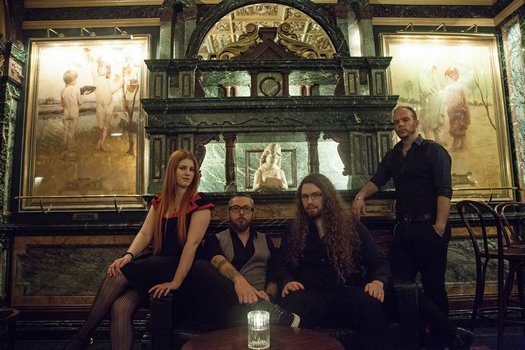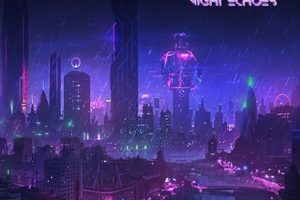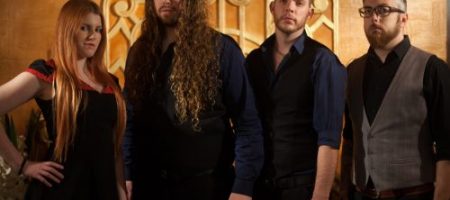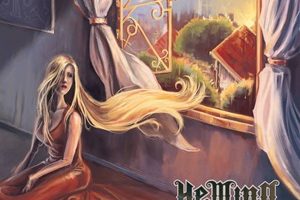Hemina – Thinking Forward Part I
Sunday, 8th January 2017
Progressive metal needs fresh blood – as stagnation can be a death knell for veteran bands. Australia’s Hemina aim to be one of those go-to acts with their wide encompassing outlook to the genre through their three full-lengths. Exploring the aural prism of shades and colors using the tools of melody, harmony, and skilled musicianship, the four-piece make their records very cinematic in terms of dynamics, diverse arrangements, and even adding in outside saxophone, trumpet, and flute parts beyond the normal electric proceedings.
Venus as the current, third album illustrates that not all newer bands wish to rape and pillage from the Dream Theater/ Symphony X camps. All four musicians in Hemina are great singers, plus the band’s focus on hooks of all types keeps the technical and shred sides from getting too far into brain overload. Heavy, spacious, glorious, and atmospheric can be adjectives used often in the same song – especially when consuming epics like “High Kite Ride” and “I”. This cross-pollination outlook, taking in influences from many European and North American bands, benefits Hemina and their fans for creativity beams and bursts through the speakers.
Ringing up vocalist/guitarist Douglas Skene on a weekend through Skype (17 hour time difference meant 3 am for me and 8 pm for him), we discuss at length the emotional, close to home concept behind Venus, his thoughts on the development of the group through friendships and certain lineup changes, as well as a fair amount of discussion on the genre as a whole plus other bands he has an interest in: including Type O Negative and Silverchair. Let’s move forward with Hemina.
Dead Rhetoric: What were your memories of music in childhood – and how did you make the progression into heavy metal and eventually picking up and instrument to play the guitar as well as singing?
Douglas Skene: I don’t remember too much when I was a younger child. I seem to recall my mom and dad used to play Beatles songs when I was younger, I have a good recollection of that. I used to like Kiss, but my parents weren’t like super musical people. They always listened to the music of their times, 60’s and 70’s rock. Later on in primary school I used to like hearing classical piano stuff, I started playing keyboards in grade four or five. That’s probably 9 or 10 years old- I was alright at that stuff but I lost interest in it within a few years. There’s a period in early high school where I wasn’t playing anything- I was listening to electronic music. Around the end of high school some of my friends were playing some of the early pop/punk rock stuff- Green Day, Blink 182- and that’s the stuff that really got me into music again and really appreciating it. I was born in 1988, so you can only imagine what I was listening to at 11-12 years old compared to discovering this stuff in high school. Britney Spears, Backstreet Boys, that was the music for the kids at my age.
I remember going to guitar lessons with a teacher, and I taught myself more stuff from there. I’d try to make the translation across from what I’d learn on piano, the teacher showed me “Enter Sandman” by Metallica on guitar, and that blew me away – I didn’t understand the sound at first but that sent me on the path to metal in general. I was trying to start a power metal band from like the end of high school, and finding the right people to play in that. We were always looking for singers, always looking for drummers- they were the hardest people to find. Guitarists are a dime a dozen, so are bass players too- but since I struggled to search for the right singer, (I thought) maybe I would start singing. It was a very hard thing to do, I wouldn’t call myself a natural singer. Singing the higher stuff is tougher, I’m more of a natural in the deeper registers. I had to learn everything about singing technique watching every single video possible on singing high notes because it didn’t come natural to me- especially the falsetto area was not very refined. The desire to not have to find someone else pushed me into doing this. I try to learn to do everything myself now, as far as the production side to anything about music theory, I like to understand everything as much as I can.
Dead Rhetoric: How do you see the work of your two previous Hemina albums Synthetic and Nebulae at this point- what do you consider the positives as far as recordings and performances, are there any particular improvements or aspects that were challenging that you had to work through?
Skene: I think Synthetic, the first album, was everything I wanted to make in an album back in about 2008. I was just coming out of university so I had been surrounded by a lot of the academia at the time, and I didn’t want to do anything that resembled what a lot of people were doing at the time. You may hear the Dream Theater similarities, which I think is something that happens with every single progressive metal band- but we were trying to do something different than verse/ chorus, standard song structures. If there was a chorus, there would be different parts so it wouldn’t feel like there were many repeated sections. We would have the whole chorus for one section and when it came back in the arrangement it would be completely different.
I may have gone a little too far on that first album, so Nebulae was a reaction to that. We lost Andrew Craig our drummer from the first album, we were working with a drummer overseas to kind of program things out. The second album I wanted to get a bit more to the point, the structures were a bit more simple, but the music was still progressive and we were still trying to push the vocal harmonies, melodic aspect of what we were doing. By the second album we had way better playing abilities than the first album, especially Mitch (Coull) and I in terms of guitar playing and the vocals took a massive step up as well. We would have never gotten there if we hadn’t made the first album, you have to have a stepping stone to get there. I like a lot of songs from that first album, I really like “Nightlines” and “Before” from the second album, and “Strength” goes down really well live, so I’m still very proud of the first two albums that we have done.
Dead Rhetoric: Venus has the added benefit of being a collaborative effort with your latest drummer Nathan McMahon in the group – as the songwriting for Nebulae developed from more of a guitar perspective. How important do you think having a live drummer is to the organic foundation of the genre – were there any specific songs that you believe Nathan’s skills shined for this release?
Skene: Yes, with the songs for Venus some of the songs had been written over the last five years, we’ve been writing them progressively. A lot of times the whole skeleton was there for a song, maybe some arrangement changes were made by Nathan for like “Starbreeze” for example was a song where he had the most contribution in terms of rearranging things, adding a section here, key changes there. A lot of times we may have had basic things already mapped out, we can’t just write a song with no drums in there and play our guitars or leave it as a complete blank canvas for someone to write on. We had to hear some of the songs in at least a pre-production state with a basic groove or tempo in there. Nathan would take some of the songs like “You” and “Fantasy”, they were quite close to how we had written them on the drums before- but stuff like “Secret’s Safe”, “I”, and “Venus”, all the epics- Nathan didn’t listen to the drums, he heard the guide tracks and final takes on guitars and he would write the drums to whatever was there, and some of it was completely different than what we had before. The biggest changes I would say were with “Secret’s Safe” and “Down Will Come Baby”- they had massive, massive differences, and he made them for the better- his drumming really shines on those two songs.
Pages: 1 2

























